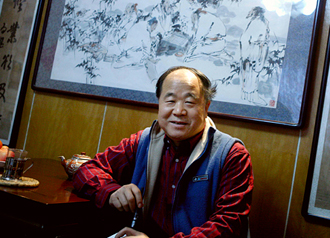Mo Yan 2nd Chinese to Win Nobel Prize in Literature
By wchung | 24 Apr, 2025
Sanctioned Winner: Mo Yan's Nobel Prize is being given warm reception by Beijing, in marked contrast to other recent winners.
Mo Yan has won the 2012 Nobel Prize in Literature, announced the Swedish Academy Thursday morning. The novelist, essayist and short-story writer, whose real name is Guan Moye, is the second Chinese to win the prize in its 112-year history.
“Through a mixture of fantasy and reality, historical and social perspectives, Mo Yan has created a world reminiscent in its complexity of those in the writings of William Faulkner and Gabriel García Márquez, at the same time finding a departure point in old Chinese literature and in oral tradition,” reads the Nobel citation. It also calls him a writer “who with hallucinatory realism merges folk tales, history and the contemporary.”
“He said he was overjoyed and scared,” an AP reporter was told by Peter Englund, the secretary of the Swedish Academy which administers the various Nobel Prizes.
China’s state-run TV broadcasters to break into a newscast to make the announcement, a sharp contrast to the government’s efforts to suppress any publicity pertaining to the awarding of the 2010 Nobel Peace Prize to jailed dissident Liu Xiaobo.
It also contrasts with the government’s cold shouldering of news of the award to novelist Gao Xingjian in 2000. By then Gao’s books had already been banned in China and Gao was living in France.
Mo’s most famous work in the west is his first novel Red Sorghum, mainly because director Zhang Yimou turned it into an internationally acclaimed film starring Chinese beauty Gong Li. The film became an art-house mainstay for years.
“Despite his social criticism is seen in his homeland as one of the foremost contemporary authors,” the citation added, referring to Mo’s 1995 novel Garlic Ballads and essays of social criticism.
Mo was born into a farming family in 1955 in Gaomi, China. He left school while in his early teens during the Cultural Revolution to work in agriculture and in a factory. His early life was often difficult due to extreme poverty.
“Loneliness and hunger were my fortunes of creation,” he once said, and recalled having to eat tree bark at times to survive.
Ironically, it wasn’t until Mo joined the People’s Liberation Army in 1976 that he began to study literature and write. Possibly because of this, any social criticism suggested in his writings has been tempered by the recognition that the Communist Party has done much to elevate the lives of ordinary people.
Mo published his first short story in a literary journal in 1981. Six years later he established himself as a major literary talent with the publication of the Chinese version of what would later be translated as Red Sorghum, a novel set in his home province. It draws heavily on his experiences as a poor farmer’s son and as an agricultural worker during the difficult years of the Cultural Revolution. The novel can be read as an implicit endorsement of the Communist Party because it shows the suffering of farmers at the hands of wealthy landlords. The English translation was published in 1993 after Zhang’s acclaimed film created a demand for it.
Mo focused on China’s great social turmoil brought on by rapid changes in The Garlic Ballads. He reverted to a more historical perspective with Big Breasts and Wide Hips (1996). In Life and Death are Wearing Me Out (2006) Mo returns to a benign criticism of contemporary society. His most recent novel is Wa (2009), seen as an oblique critique of China’s one-child policy.
His latest novel, Sandalwood Death, is scheduled to be published in English translation in 2013.
Mo will travel to Stockholm in December to receive the prize of 8 million Swedish kronor ($1.2 million).
In addition to the two Chinese authors, the Nobel Literature Prize has been awarded to Japanese authors Kenzaburo Oe in 1994 and Yasunari Kawabata in 1968.

The 2012 Nobel Prize in Literature to Mo Yan was announced on October 11, 2012. Mo is the second Chinese to win the prize but the first to win it while living in China.
Articles
- Glow Recipe Hits $300M by Seducing Gen-Z Women — and Their Little Sisters
- Jiang-Ping Wang's Iron Nitride Magnet May End China's Dominance in Key Tech Component
- JD Vance Probably Didn’t Cause the Pope’s Death
- ‘Asian Francis’ Emerges As Top Contender To Become Pope
- San Diego State Adds Asian American Studies Department
Asian American Success Stories
- The 130 Most Inspiring Asian Americans of All Time
- 12 Most Brilliant Asian Americans
- Greatest Asian American War Heroes
- Asian American Digital Pioneers
- New Asian American Imagemakers
- Asian American Innovators
- The 20 Most Inspiring Asian Sports Stars
- 5 Most Daring Asian Americans
- Surprising Superstars
- TV’s Hottest Asians
- 100 Greatest Asian American Entrepreneurs
- Asian American Wonder Women
- Greatest Asian American Rags-to-Riches Stories
- Notable Asian American Professionals

